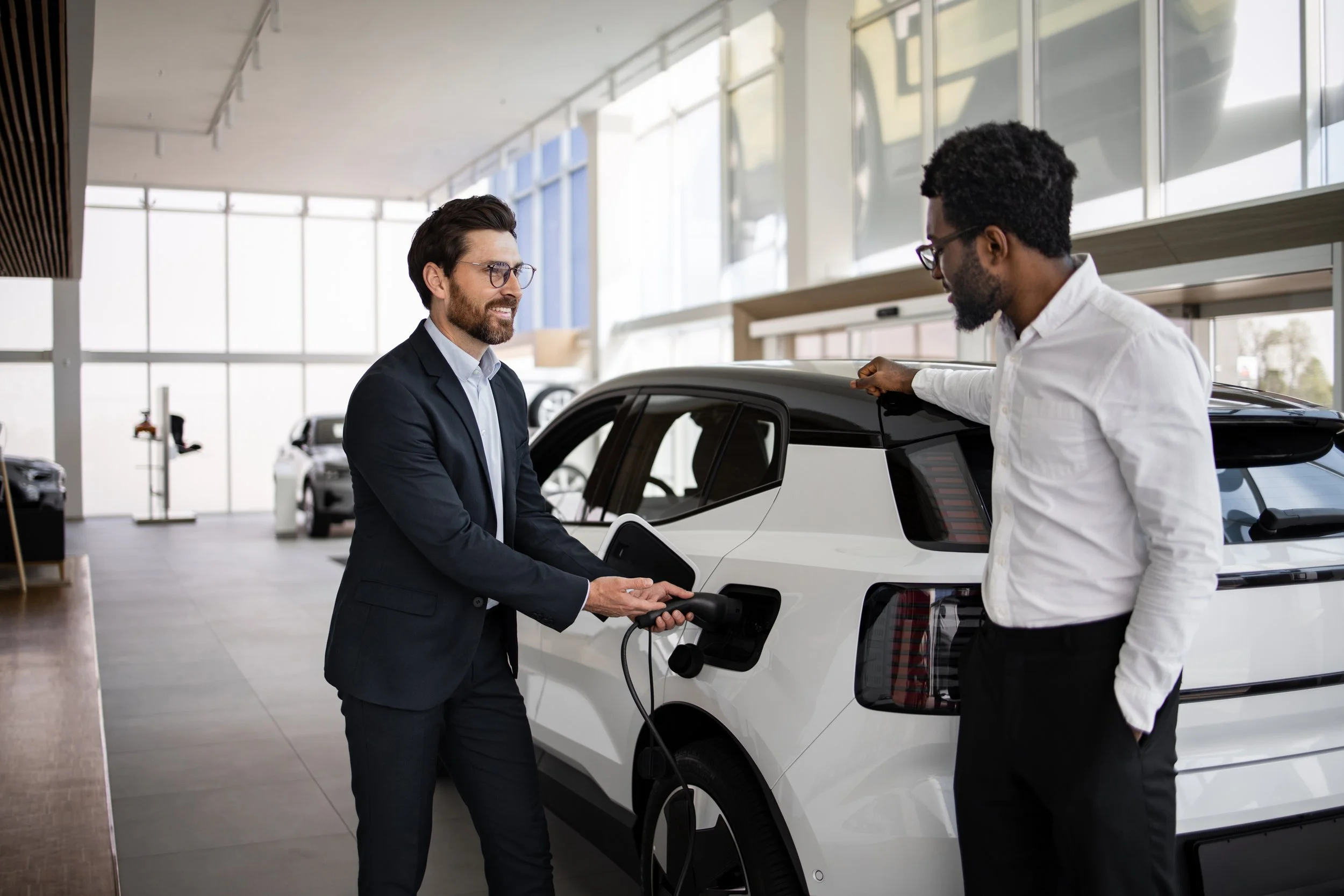Can You Salary Sacrifice Non Electric Cars? Why EVs Are the Smarter Choice
Source: Shutterstock
Many employees wonder whether they can salary sacrifice traditional petrol or diesel vehicles. The short answer is yes – but the financial mathematics make electric car salary sacrifice a far superior choice. Here's why The Electric Car Scheme focuses exclusively on electric vehicles and hybrids to deliver maximum value.
Understanding Salary Sacrifice for Traditional Cars
Salary sacrifice for conventional vehicles works on the same basic principle as electric car schemes. Employees agree to reduce their gross salary in exchange for a company car, reducing their Income Tax and National Insurance contributions. However, the similarities end there.
The critical difference lies in Benefit-in-Kind (BiK) tax rates. While electric vehicles benefit from a preferential 3% BiK rate in 2025/26, traditional cars face punitive rates that can reach up to 37% depending on their CO2 emissions. This dramatic difference fundamentally changes the financial equation.
Why BiK Rates Make EVs the Clear Winner
Benefit-in-Kind tax is calculated based on three factors: the vehicle's P11D value, the employee's tax bracket, and crucially, the car's CO2 emissions. Here's where traditional vehicles struggle:
High-emission petrol cars: Face BiK rates of up to 37%
Low-emission petrol cars: Still face BiK rates of 20-25%
Electric vehicles: Benefit from just 3% BiK in 2025/26
For a £40,000 vehicle, a 40% taxpayer would pay approximately £4,440 annually in BiK tax for a high-emission petrol car, compared to just £360 for an electric vehicle – a staggering £4,080 difference.
The Electric Car Scheme's EV-Only Approach
The Electric Car Scheme deliberately focuses on electric vehicles to maximise employee savings and deliver genuine environmental benefits. This approach creates several advantages:
Maximum Financial Savings: By concentrating on vehicles with the lowest BiK rates, employees can save 20-50% compared to traditional car leasing or purchasing.
Environmental Leadership: Every EV through our scheme contributes to green initiatives and helps companies achieve their net-zero commitments.
Future-Proofing: With the UK's 2030 ban on new petrol and diesel car sales, EV salary sacrifice prepares employees for the inevitable transition.
Running Cost Advantages of Electric Vehicles
Beyond BiK tax advantages, electric vehicles offer substantial running cost savings that traditional cars cannot match. Electric car running costs are significantly lower due to:
Fuel Savings: Electricity costs approximately 7-15p per mile compared to 15-20p per mile for petrol
Maintenance Savings: EVs require approximately 50% less maintenance due to fewer moving parts
Tax Exemptions: Electric vehicles remain exempt from various charges including ULEZ fees in many areas
These operational savings compound the BiK tax advantages, making the total cost of ownership dramatically lower for electric vehicles.
Hybrid Vehicles: A Middle Ground
While The Electric Car Scheme primarily focuses on pure electric vehicles, we do offer hybrid options for employees seeking a transitional solution. Modern plug-in hybrids benefit from reduced BiK rates compared to traditional petrol cars, though they still cannot match the 3% rate available to pure EVs.
Popular hybrid options like the Toyota Prius or various BMW hybrid models offer BiK rates of 5-12%, providing a middle ground for employees concerned about charging infrastructure or range.
The Triple Win of EV Salary Sacrifice
The Electric Car Scheme's focus on electric vehicles creates what we call the "triple win":
Employee Savings: Maximum financial benefits through low BiK rates and reduced running costs
Employer Benefits: No setup costs, reduced administrative burden, and enhanced employee benefits package Environmental Impact: Direct contribution to reducing transport emissions and supporting sustainability goals
Why Not Traditional Salary Sacrifice Cars?
While other providers offer salary sacrifice schemes for traditional vehicles, the mathematics simply don't stack up. A high-emission petrol car through salary sacrifice might actually cost more than a personal lease due to BiK tax implications.
Consider a £35,000 BMW 320i with 30% BiK rate versus a Tesla Model 3 with 3% BiK. The BMW would incur £4,200 annual BiK tax for a 40% taxpayer, while the Tesla would cost just £420 – a £3,780 annual difference that more than offsets any price premium.
Looking to the Future
The UK government's commitment to phasing out internal combustion engines makes electric car salary sacrifice not just financially sensible today, but essential for future-proofing employee benefits.
BiK rates for electric vehicles are scheduled to increase gradually to 9% by 2029, but will remain substantially below traditional vehicle rates. This ensures that EV salary sacrifice will continue delivering superior value throughout the transition to electrification.
Making the Right Choice
While salary sacrifice is technically available for all vehicle types, The Electric Car Scheme focuses exclusively on electric and hybrid vehicles because the numbers don't lie. With 3% BiK rates, lower running costs, and environmental benefits, electric vehicles offer the compelling value proposition that traditional cars simply cannot match.
For employees seeking maximum savings and companies aiming to provide genuinely valuable benefits while supporting sustainability goals, electric car salary sacrifice represents the smart choice in 2025 and beyond.
Ready to discover how much you could save with an electric car salary sacrifice scheme? Calculate your potential savings and join the thousands of employees already benefiting from the UK's most cost-effective approach to driving electric.
Are you an employer?
BOOK A DEMOAre you an employee?
SEE AVAILABLE CARSYou might also like…
Last updated: 23/09/2025
Our pricing is based on data collected from The Electric Car Scheme quote tool. All final pricing is inclusive of VAT. All prices above are based on the following lease terms; 10,000 miles pa, 36 months, and are inclusive of Maintenance and Breakdown Cover. The Electric Car Scheme’s terms and conditions apply. All deals are subject to credit approval and availability. All deals are subject to excess mileage and damage charges. Prices are calculated based on the following tax saving assumptions; England & Wales, 40% tax rate. The above prices were calculated using a flat payment profile. The Electric Car Scheme Limited provides services for the administration of your salary sacrifice employee benefits. The Electric Car Scheme Holdings Limited is a member of the BVRLA (10608), is authorised and regulated by the FCA under FRN 968270, is an Appointed Representative of Marshall Management Services Ltd under FRN 667174, and is a credit broker and not a lender or insurance provider.
Copyright and Image Usage: All images used on this website are either licensed for commercial use or used with express permission from the copyright holders, in compliance with UK and EU copyright law. We are committed to respecting intellectual property rights and maintaining full compliance with applicable regulations. If you have any questions or concerns regarding image usage or copyright matters, please contact us at marketing@electriccarscheme.com and we will address them promptly.




